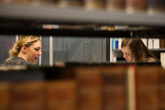In recent years, theorists have frequently described contemporary global labour conditions as “feminized”, meaning that the experiences and practices once primarily associated with women workers are becoming the standard for the labour market in general. Meanwhile, in twentieth-century anglophone literature, conventional forms of women’s work (including housework, emotional labour, and service work) are frequently explored through both form and content. This project therefore situates twentieth century literary texts which engage with women’s work in relation to contemporary theorizations of feminization. It reads literature transhistorically, to show that the archive of twentieth-century literary representations of “women’s work” are a rich, as-yet untapped resource for understanding the major trend towards feminization in the twenty-first century work world. Moreover, it contributes to theorizations of contemporary feminized labour through critical analysis of the rhetorical strategies, narrative structures, and images used to depict women’s work in 20th century anglophone literature.
Feminized: A New Literary History of Women s Work
Bevillingshaver: Emily Hogg
Periode: 2021-2024
